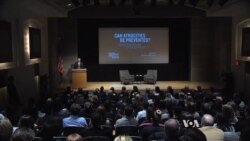The first U.N. human rights chief who is an Arab and a Muslim on Thursday also became the first person in that position to visit the U.S. Holocaust Memorial Museum in Washington.
As part of his first official visit to the United States, Zeid Ra’ad al-Hussein gave a speech about preventing atrocities. He said all people “must learn” about the Holocaust and ask themselves “why so many ordinary people could kill so easily, feeling no guilt whatsoever.”
The Jordanian prince, whose formal title is the U.N. High Commissioner for Human Rights, said the horror of the Holocaust is key to understanding the more recent slaughter by Islamist militants of defenseless people in Iraq, Somalia, Nigeria and elsewhere — and the death by fire of a pilot from his own country.
He referred to the militants as “takfiri” or “infidels,” despite their claims to be acting in the name of Islam, and said they were deceiving their followers with Nazi-like lies and chauvinistic logic.
“If we have learned anything from our collective history, it is this: Scrambling only for ourselves, our people, our political or religious ideology, or for our own kind will only scramble it all — eventually, sometimes horrifyingly so — for everyone,” he said.
Zeid, who helped set up the International Criminal Court in The Hague in 2002, said the antidote to such logic is human rights education for every child in the world, beginning before the age of nine.
“In this way, from Catholic parochial schools to the most secular public institutions, and indeed Islamic madrassahs, children could learn — even in kindergarten — and experience the fundamental human rights values of equality, justice and respect."
Zeid’s address filled an auditorium inside the U.S. Holocaust Memorial Museum past its capacity. Among those in attendance were a few people who survived the Nazi genocide and now work as volunteers at the museum.
Margit Meissner was born in Austria in 1922 and escaped with her family by trekking across the Pyrennees. She said Zeid’s speech was “right on the money.”
“What he said is very important,” Meissner said. “It’s just a question of how can one do it, and how much willingness is there in the world to do it, because everybody throws up his hands and says, 'What a terrible thing,' and then they go about their business.”





